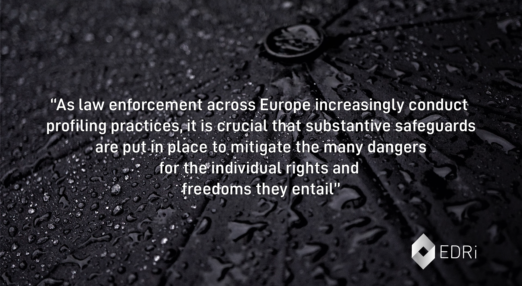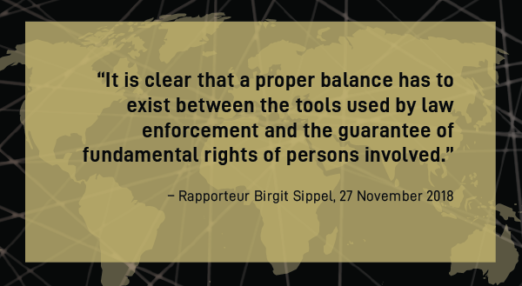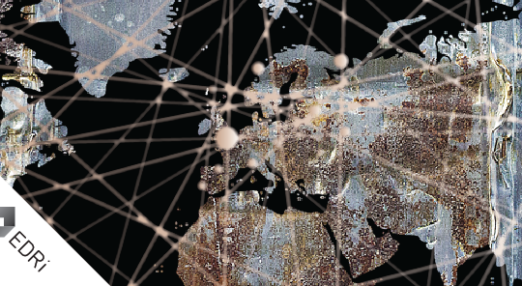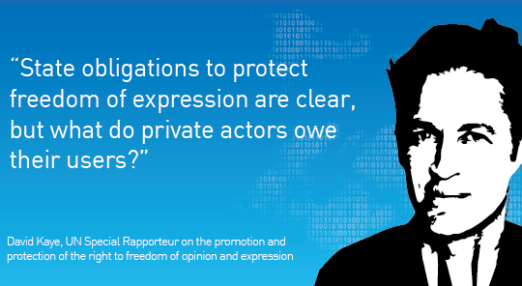access to data
Filter by...
-

Big brother at the Prague airport. The state refuses to explain how the biometric camera system works
When Václav Mach, collaborator of the Czech digital-legal organization, an EDRi member, Iuridicum Remedium (IuRe) and law student at the University of Olomouc, asked the state for more detailed information on the use of smart biometric cameras at Prague's Václav Havel Airport, he obtained just general phrases. "They kept secret what they could. Their non-transparency doesn’t add to their credibility,“ he says in an interview with HlídacíPes.org. The article below is a summary of the more extensive interview, translated from Czech into English by EDRi member IuRe.
Read more
-

CJEU upholds strict requirements for law enforcement access to electronic communications metadata
Traffic and location data may allow precise conclusions to be drawn about the persons involved, e.g. their social relationships or the social environments frequented by them. In most cases, the CJEU has only allowed access to such data for serious crimes. However, the CJEU ruled that access to retained data is only allowed in cases of serious crime when the access implies a serious interference, and in all criminal cases when the access does not imply a serious interference.
Read more
-

Stuck under a cloud of suspicion: Profiling in the EU
As facial recognition technologies are gradually rolled out in police departments across Europe, anti-racism groups blow the whistle on the discriminatory over-policing of racialised communities linked to the increasing use of new technologies by law enforcement agents.
Read more
-

Double legality check in e-evidence: Bye bye “direct data requests”
After having tabled some 600 additional amendments, members of the European Parliament Committee on Civil Liberties (LIBE) are still discussing the conditions under which law enforcement authorities in the EU should access data for their criminal investigations in cross-border cases. One of the key areas of debate is the involvement of a second authority in […]
Read more
-

“E-evidence”: Repairing the unrepairable
On 11 November 2019, Member of the European Parliament (MEP) Birgit Sippel (S&D), Rapporteur for the Committee on Civil Liberties, Justice and Home Affairs (LIBE) presented her draft Report, attempting to fix the many flaws of the European Commission’s “e-evidence” proposal. Has Sippel MEP been successful at repairing the unrepairable? The initial e-evidence proposal by […]
Read more
-

Cross-border access to data for law enforcement: Document pool
The European Commission proposed a Regulation on cross-border access to and preservation of electronic data held by service providers and a Directive to require service providers to appoint a legal representative within the EU in April 2018. Since then, the legislative process to adopt them has been fast-tracked, which has prevented any proper assessment of […]
Read more
-

LIBE Committee analysis: Challenges of cross-border access to data
On 7 February, the European Parliament Committee on Civil Liberties, Justice and Home Affairs (LIBE) presented two new working documents analysing further the issue of cross-border access to data in criminal matters, also known as “e-evidence”.
Read more
-

CJEU introduces new criteria for law enforcement to access data
On 2 October 2018, the Court of Justice of the European Union (CJEU) delivered a new ruling in the “Ministerio Fiscal” case on access to data retained by electronic communications service providers under the scope the ePrivacy Directive.
Read more
-

UN Rapporteur demands respect for freedom of expression online
The United Nations (UN) Special Rapporteur on the promotion and protection of the right to freedom of opinion and expression David Kaye has released a new report, which gives an overview of the problems for freedom of expression and opinion in the Telecommunications and Internet Access Sector. The report also provides general recommendations for states […]
Read more
